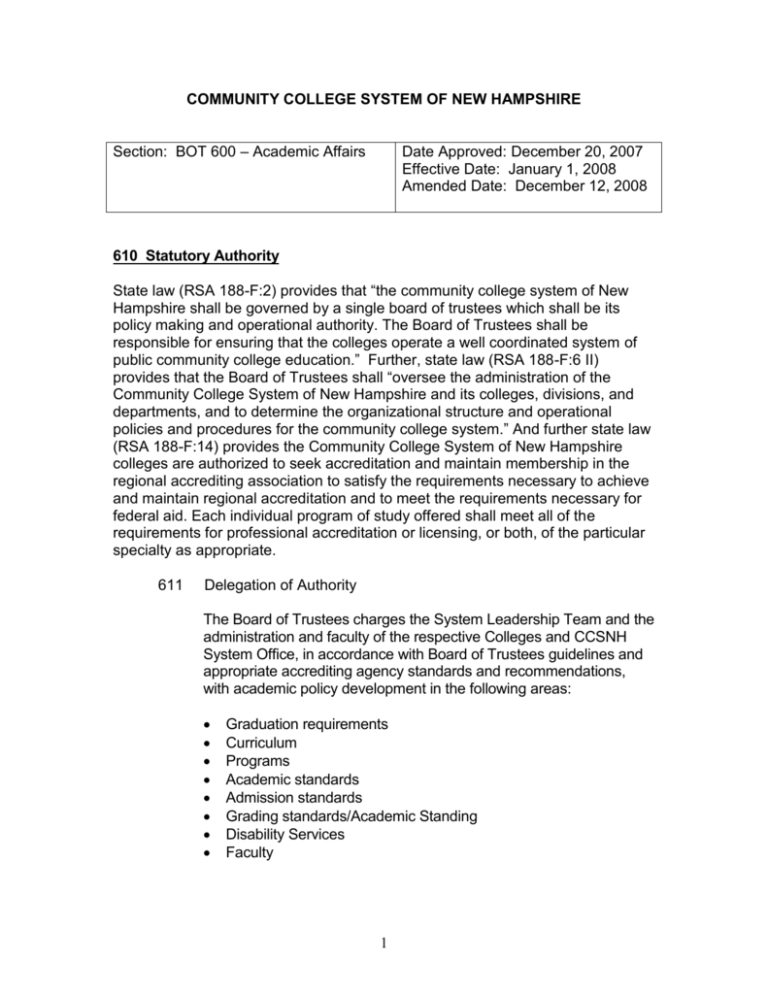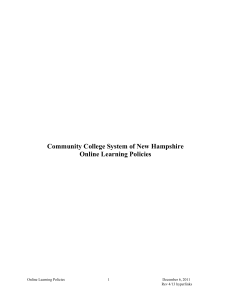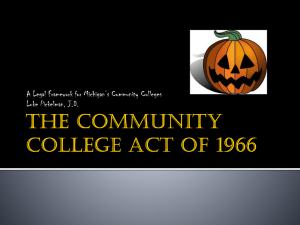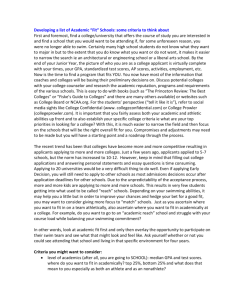Academic Affairs - Community College System of New Hampshire
advertisement

COMMUNITY COLLEGE SYSTEM OF NEW HAMPSHIRE Section: BOT 600 – Academic Affairs Date Approved: December 20, 2007 Effective Date: January 1, 2008 Amended Date: December 12, 2008 610 Statutory Authority State law (RSA 188-F:2) provides that “the community college system of New Hampshire shall be governed by a single board of trustees which shall be its policy making and operational authority. The Board of Trustees shall be responsible for ensuring that the colleges operate a well coordinated system of public community college education.” Further, state law (RSA 188-F:6 II) provides that the Board of Trustees shall “oversee the administration of the Community College System of New Hampshire and its colleges, divisions, and departments, and to determine the organizational structure and operational policies and procedures for the community college system.” And further state law (RSA 188-F:14) provides the Community College System of New Hampshire colleges are authorized to seek accreditation and maintain membership in the regional accrediting association to satisfy the requirements necessary to achieve and maintain regional accreditation and to meet the requirements necessary for federal aid. Each individual program of study offered shall meet all of the requirements for professional accreditation or licensing, or both, of the particular specialty as appropriate. 611 Delegation of Authority The Board of Trustees charges the System Leadership Team and the administration and faculty of the respective Colleges and CCSNH System Office, in accordance with Board of Trustees guidelines and appropriate accrediting agency standards and recommendations, with academic policy development in the following areas: Graduation requirements Curriculum Programs Academic standards Admission standards Grading standards/Academic Standing Disability Services Faculty 1 620 Graduation Requirements – Board Policy The degrees and other forms of recognition at each college are appropriately named following practices common to American institutions of higher education. Programs are designed to give students a substantial and coherent introduction to the broad areas of human knowledge, plus in-depth study in at least one disciplinary area. Formal systems are in place at each college to ensure that a student has met all requirements for a degree, diploma or certificate. Credit towards a degree, diploma or certificate will not be awarded for pre-college or remedial level course work. 630 Curriculum Curriculum is the responsibility of each CCSNH college. It is designed to fulfill the college’s mission to provide quality educational experiences for students that prepare them for work, transfer to another post-secondary institution, and full participation in wider community life. 640 Programs Programs will be developed and/or distributed in a way that the CCSNH provides sufficient educational infrastructure to support all existing and future business and industry in a region. Furthermore, programs shall provide easily accessible education which meets the needs and desires of the student customer market. And, finally, programs will be developed in consideration of the social, economic, demographic and employment needs of the local region and community. It is the position of the Board of Trustees of the CCSNH that each CCSNH college is an economic engine for the local community, and, therefore, each college has an obligation to respond to the community’s educational needs. The Board recognizes that a college may have a local need to start a new associate, diploma, professional certificate or certificate program that duplicates or approximates an existing program at another CCSNH college, and that such duplication may be both appropriate and beneficial. However, the Board also understands that some programs draw students from a very broad region, that some programs are much more expensive to initiate and develop than others, and that the System as a whole has an interest in avoiding the kind of duplication that increases costs without significantly expanding student access. The System can best serve the needs of the State by ensuring that all Colleges are academically strong and operationally efficient. Therefore, the Chancellor and the Colleges are charged with balancing these needs as defined above when bringing forward proposals for new programs. 2 To respond to the needs of business and industry for a better trained and skilled workforce to compete in an increasingly global economy, CCSNH is committed to providing global access to our students and in exposing them to issues affecting global economy. This shall be accomplished by the admission of international students, curricular and program development, study abroad opportunities for faculty, staff and students. The CCSNH also collaborates with state and local economic development agencies in the promotion of New Hampshire for international business opportunities. While program development and maintenance are the responsibility of each college, all requests for new programs and/or the elimination of current programs must be approved by the CCSNH Board of Trustees. In each case, the decision to create or eliminate a program must be aligned with the comprehensive institutional plan which has the approval of the college’s President and internal leadership team. 650 Academic Standards The degrees and other forms of academic recognition shall be appropriately named following practices common to American institutions of higher education in terms of both length and content of programs. The award of credit will be based on policies developed and overseen by the faculty and academic administration and will comply with standards set forth by applicable accrediting agencies. Credit awards must be consistent with course content, appropriate to the field of study, and reflect the level and amount of student learning. In accepting transfer credit, credit by exam and experiential credit, the colleges will apply policies and procedures that ensure that credits awarded reflect appropriate levels of academic quality and are applicable to the student’s program. The CCSNH accepts transfer credit from regionally accredited postsecondary institutions and other educational bodies as recognized by the individual colleges. 660 Admission Standards Individual colleges will have general admission requirements that are clearly published in the college’s catalogue and website. Departments within the college may have additional admission requirements for their programs. These requirements will also be clearly published in the college’s catalogue. 3 670 Grading Standards/Academic Standing Assessment and grading are the prerogative and obligation of the faculty. It is the responsibility of a faculty member to grade his/her students and to report grades in a timely fashion as required. Grades and the documentation used to calculate them are a product of work and are consequently the property of the CCSNH College. The Vice President of Academic Affairs, in consultation with an appropriate Department Chairperson/Coordinator, may demand that student grades for any courses and the documentation used to calculate them or faithful copies thereof be provided for his/her review on demand. A formal process will be in place at each college to allow for the appeal of a grade by a student. The CSNH shall have standards which define the student’s academic standing at the end of each semester. The standards will clearly indicate whether the student is in good academic standing or will be placed on academic probation or academic suspension. If a student is permanently dismissed from a program or a college for academic reasons, a formal process will be in place for making that decision. 680 Disabilities Services It is the mission of Community College System of New Hampshire Disabilities Services to provide equal educational access, opportunities, and experiences to all qualified students with documented disabilities who register with the college’s Disabilities Services office. Reasonable accommodations shall be provided to students to allow them to achieve at a level limited only by their abilities and not by their disabilities. Assistance will be provided in a collaborative way to help students develop strong and effective independent learning and self-advocacy skills, as they assume responsibility for reaching their academic goals. Under the Americans with Disabilities Act (ADA) of 1990 and Section 504 of the Rehabilitation Act of 1973, individuals with disabilities are protected from discrimination and may be entitled to reasonable accommodations and rights to equal access to programs and services. To establish that an individual is covered under the ADA, documentation must indicate that a specific disability exists and that the identified disability substantially limits one or more major life activity. The documentation must also support the request for accommodations, academic adjustments, and/or auxiliary aids. A diagnosis of a disorder/condition/syndrome in and of itself does not automatically qualify an individual for accommodations under the ADA. 4 690 Faculty Each college in the CCSNH will develop a faculty that is suited to the fulfillment of the institution’s mission. The preparation and qualifications of the faculty shall be appropriate to the field and level of their assignments. Qualifications will be measured by advanced degrees held, evidence of scholarship, advanced study, creative activities, teaching abilities and relevant professional experience, training, and credentials. Responsibilities of full-time faculty include the following: Teaching and learning Academic contributions to a department and/or the college Service to students Service to the college and community Professional growth and development Responsibilities of part-time faculty are limited to those accountabilities associated with teaching a course at a college. Each college will have in place a process to evaluate faculty effectiveness in the areas designated above. Regarding academic freedom, the Board of Trustees of the CCSNH subscribes to the statement authored by the Association of American University Professors (AAUP). 5











